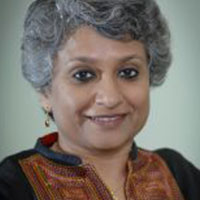Contributor : Profile
Ashwini Deshpande is Professor of Economics at Ashoka University. Prior to this she was at the Delhi School of Economics, University of Delhi, India. Her Ph.D. and early publications have been on the international debt crisis of the 1980s. Subsequently, she has been working on the economics of discrimination and affirmative action issues, with a focus on caste and gender in India, as well as on aspects of the Chinese economy: poverty, inequality, regional disparities and gender discrimination. She has published extensively in leading scholarly journals and has edited several books. She is the author of "Grammar of Caste: economic discrimination in contemporary India", OUP, 2011 and "Affirmative Action in India", OUP, Oxford India Short Introductions series, 2013. She received the EXIM Bank award for outstanding dissertation (now called the IEDRA Award) in 1994, and the 2007 VKRV Rao Award for Indian economists under 45.
Posts by Ashwini Deshpande
A tribute to Prof. Ashok Kotwal by Prof. Ashwini Deshpande
Prof. Ashwini Deshpande pens a heartfelt tribute to our founder Editor-in-Chief Prof. Ashok Kotwal.
-
 Ashwini Deshpande
Ashwini Deshpande  03 May, 2022
03 May, 2022
- Perspectives
नकुशा: बेटों की चाहत, अवांछित बेटियाँ और स्कूली शिक्षा में लैंगिक-अंतर
भारतीय समाज में सांस्कृतिक प्राथमिकताओं के कारण बेटों की चाहत आम बात है। 1986 से 2017 तक राष्ट्रीय रूप का प्रतिनिधित्व करते आंकड़ों का प्रयोग कर यह आलेख बेटों की तुलना में बेटियों की शिक्षा पर, मा...
-
 Ashwini Deshpande
Ashwini Deshpande  Apoorva Gupta
Apoorva Gupta  12 नवंबर, 2020
12 नवंबर, 2020
- लेख
Nakusha: Son preference, ‘unwanted’ girls, and gender gaps in schooling
Indian society is commonly associated with a strong cultural preference for sons. Using nationally representative data from 1986-2017, this article examines parental investment in the education of son...
-
 Ashwini Deshpande
Ashwini Deshpande  Apoorva Gupta
Apoorva Gupta  25 September, 2020
25 September, 2020
- Articles
कोविड-19: क्या हम लंबी दौड़ के लिए तैयार हैं? - भाग 2
इस आलेख के पहले भाग में, लेखकों ने भारत में कोविड-19 के प्रति सरकार की प्रतिक्रिया का मार्गदर्शन करने हेतु व्यापक सिफारिशें कीं। इस भाग में, वे पांच ऐसे समूहों की पहचान करते हैं जिनके वर्तमान संकट से ...
-
 Abhinash Borah
Abhinash Borah  Sabyasachi Das
Sabyasachi Das  Aparajita Dasgupta
Aparajita Dasgupta  Ashwini Deshpande
Ashwini Deshpande  Kanika Mahajan
Kanika Mahajan  Bharat Ramaswami
Bharat Ramaswami  Anuradha Saha
Anuradha Saha  Anisha Sharma
Anisha Sharma  08 अप्रैल, 2020
08 अप्रैल, 2020
- लेख
कोविड-19: क्या हम लंबी दौड़ के लिए तैयार हैं? - भाग 1
कोविड-19 के प्रसार की संभावित पुनरावृत्ति को रोकने के लिए यह लॉकडाउन, संभवतः भविष्य में किए जाने वाले कई लॉकडाउन में से पहला हो सकता है, इसलिए नीति निर्माताओं को इससे प्रतिकूल रूप से प्रभावित व्यक्तिय...
-
 Abhinash Borah
Abhinash Borah  Sabyasachi Das
Sabyasachi Das  Aparajita Dasgupta
Aparajita Dasgupta  Ashwini Deshpande
Ashwini Deshpande  Kanika Mahajan
Kanika Mahajan  Bharat Ramaswami
Bharat Ramaswami  Anuradha Saha
Anuradha Saha  Anisha Sharma
Anisha Sharma  06 अप्रैल, 2020
06 अप्रैल, 2020
- दृष्टिकोण
Covid-19: Are we ready for the long haul? - Part II
In Part I of this piece, the authors made broad recommendations to guide the government’s response to Covid-19 in India. In this part, they identify five salient population groups that are particula...
-
 Abhinash Borah
Abhinash Borah  Sabyasachi Das
Sabyasachi Das  Aparajita Dasgupta
Aparajita Dasgupta  Ashwini Deshpande
Ashwini Deshpande  Kanika Mahajan
Kanika Mahajan  Bharat Ramaswami
Bharat Ramaswami  Anuradha Saha
Anuradha Saha  Anisha Sharma
Anisha Sharma  03 April, 2020
03 April, 2020
- Perspectives
Covid-19: Are we ready for the long haul? - Part I
As this may be the first of many future lockdowns to stamp out possible repeated outbreaks of Covid-19, policymakers must be prepared to provide relief to adversely affected individuals. With this in ...
-
 Abhinash Borah
Abhinash Borah  Sabyasachi Das
Sabyasachi Das  Aparajita Dasgupta
Aparajita Dasgupta  Ashwini Deshpande
Ashwini Deshpande  Kanika Mahajan
Kanika Mahajan  Bharat Ramaswami
Bharat Ramaswami  Anuradha Saha
Anuradha Saha  Anisha Sharma
Anisha Sharma  02 April, 2020
02 April, 2020
- Perspectives
Traditional hierarchies and affirmative action in a globalising economy: Evidence from India
India has had a long-standing policy of affirmative action to address deep-rooted caste inequities and discrimination. This article compares successive age cohorts of three broad social groups – Sch...
-
 Ashwini Deshpande
Ashwini Deshpande  Rajesh Ramachandran
Rajesh Ramachandran  21 June, 2019
21 June, 2019
- Articles
दस प्रतिशत कोटा: क्या जाति अब पिछड़ेपन की सूचक नहीं रही है?
संविधान (124वां संशोधन) विधेयक 2019 सरकारी नौकरियों और उच्च शिक्षा संस्थानों में 10 प्रतिशत आरक्षण देकर ‘‘आर्थिक रूप से पिछड़े तबकों’’ को आगे बढ़ाने के प्रावधान का प्रयास करता है। इसका मतलब कोटा के आध...
-
 Ashwini Deshpande
Ashwini Deshpande  Rajesh Ramachandran
Rajesh Ramachandran  06 जून, 2019
06 जून, 2019
- लेख
The 10% quota: Is caste no longer an indicator of backwardness?
The Constitution (124th Amendment) Bill 2019 seeks to provide for the advancement of “economically weaker sections”, through 10% reservation in government jobs and higher educational institutions ...
-
 Ashwini Deshpande
Ashwini Deshpande  Rajesh Ramachandran
Rajesh Ramachandran  17 May, 2019
17 May, 2019
- Articles
Social identity and perceived income adequacy
Perceptions about income adequacy, in addition to actual income adequacy, are a critical part of individual well-being. However, factors that determine these perceptions have not been well-investigate...
-
 Ashwini Deshpande
Ashwini Deshpande  Deepti Goel
Deepti Goel  13 June, 2018
13 June, 2018
- Articles
Women and the Indian job market: Glass ceiling or sticky floor?
The gender wage gap among regular wage and salaried workers in India was 49% in 2009-10. This column finds the bulk of the gap is due to discrimination against women in the job market, rather than di...
-
 Ashwini Deshpande
Ashwini Deshpande  Deepti Goel
Deepti Goel  Shantanu Khanna
Shantanu Khanna  10 June, 2016
10 June, 2016
- Articles




